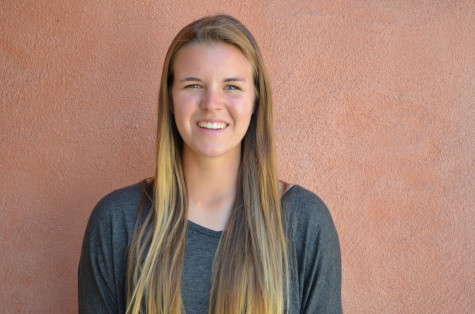Alumni compete at the collegiate level
As fall season comes to a close at the Upper School, alumni are taking their sports to new heights as they compete at the collegiate level.
All agreed that the biggest difference between high school and collegiate sports is the amount of commitment required to participate.
“Participating in a college sport is definitely much more of a commitment regarding time and energy,” Siobhan said. “Going from meetings, to the training room, to the gym for work-outs, to the training field to practice, and then ultimately the stadium to play, it is somewhat of an all day, every day event.”
Another challenge, according to Michael, arises when playing against seniors as a freshman.
“Coming in as a freshman, we are competing against fifth-year seniors and seniors that are far older and more developed,” he said. “Developing to play against players that are so much older and stronger is the hardest part of playing in college.”
Despite the hard work and time commitment that the athletes give to the team, the end result, such as winning a game or winning the league makes it worth it, according to Gautam.
“I’d have to say success is probably the best part of playing a sport in college,” Gautam said. “After putting time in all off-season, it’s great to see that work blossom into something great, such as the Rose Bowl for us last season.”
According to the athletes, another perk is the friendship gained from being on a team. For many athletes, the bond created on a sports team is far stronger than any made out of the athletic arena.
“The absolute best part about swimming at USC is my team,” Kevin said. “We really connected instantly because all of us carry the same goal. We have a combined men’s and women’s swim and dive program, and it’s basically an instant 70 best friends as soon as I stepped on campus.”
As with high school athletes, time management remains essential for the college athletes, especially with the increased time commitment of the sport. Universities often provide additional academic help for athletes.
“[Managing academics] is a bit difficult, but here we have a ton of resources available to help us out, including academic advisors and tutoring groups,” Siobhan said. “There is always someone to talk to to help us with scheduling conflicts and how to work them out, and even advisors who specialize in time management and study habits if that is what people need to help balance their schedules.”
For students hoping to get recruited, Jessica offered some advice.
“I would recommend that they make sure they really love and still enjoy the sport they are in,” she said. “I know many people who quit in college because it’s a lot of time commitment, and they realize that they don’t actually love it anymore. They also need to work hard at the sport and be willing to make sacrifices.”
Information about upcoming games resides on university websites, although the seasons are coming to a close with the start of the NCAA tournaments.

Alyssa Amick (12) is the Co- Editor in Chief of Harker Aquila. She has been part of the journalism program since her freshman year. Her favorite part of...


















![“[Building nerf blasters] became this outlet of creativity for me that hasn't been matched by anything else. The process [of] making a build complete to your desire is such a painstakingly difficult process, but I've had to learn from [the skills needed from] soldering to proper painting. There's so many different options for everything, if you think about it, it exists. The best part is [that] if it doesn't exist, you can build it yourself," Ishaan Parate said.](https://harkeraquila.com/wp-content/uploads/2022/08/DSC_8149-900x604.jpg)




![“When I came into high school, I was ready to be a follower. But DECA was a game changer for me. It helped me overcome my fear of public speaking, and it's played such a major role in who I've become today. To be able to successfully lead a chapter of 150 students, an officer team and be one of the upperclassmen I once really admired is something I'm [really] proud of,” Anvitha Tummala ('21) said.](https://harkeraquila.com/wp-content/uploads/2021/07/Screen-Shot-2021-07-25-at-9.50.05-AM-900x594.png)







![“I think getting up in the morning and having a sense of purpose [is exciting]. I think without a certain amount of drive, life is kind of obsolete and mundane, and I think having that every single day is what makes each day unique and kind of makes life exciting,” Neymika Jain (12) said.](https://harkeraquila.com/wp-content/uploads/2017/06/Screen-Shot-2017-06-03-at-4.54.16-PM.png)








![“My slogan is ‘slow feet, don’t eat, and I’m hungry.’ You need to run fast to get where you are–you aren't going to get those championships if you aren't fast,” Angel Cervantes (12) said. “I want to do well in school on my tests and in track and win championships for my team. I live by that, [and] I can do that anywhere: in the classroom or on the field.”](https://harkeraquila.com/wp-content/uploads/2018/06/DSC5146-900x601.jpg)
![“[Volleyball has] taught me how to fall correctly, and another thing it taught is that you don’t have to be the best at something to be good at it. If you just hit the ball in a smart way, then it still scores points and you’re good at it. You could be a background player and still make a much bigger impact on the team than you would think,” Anya Gert (’20) said.](https://harkeraquila.com/wp-content/uploads/2020/06/AnnaGert_JinTuan_HoHPhotoEdited-600x900.jpeg)

![“I'm not nearly there yet, but [my confidence has] definitely been getting better since I was pretty shy and timid coming into Harker my freshman year. I know that there's a lot of people that are really confident in what they do, and I really admire them. Everyone's so driven and that has really pushed me to kind of try to find my own place in high school and be more confident,” Alyssa Huang (’20) said.](https://harkeraquila.com/wp-content/uploads/2020/06/AlyssaHuang_EmilyChen_HoHPhoto-900x749.jpeg)


